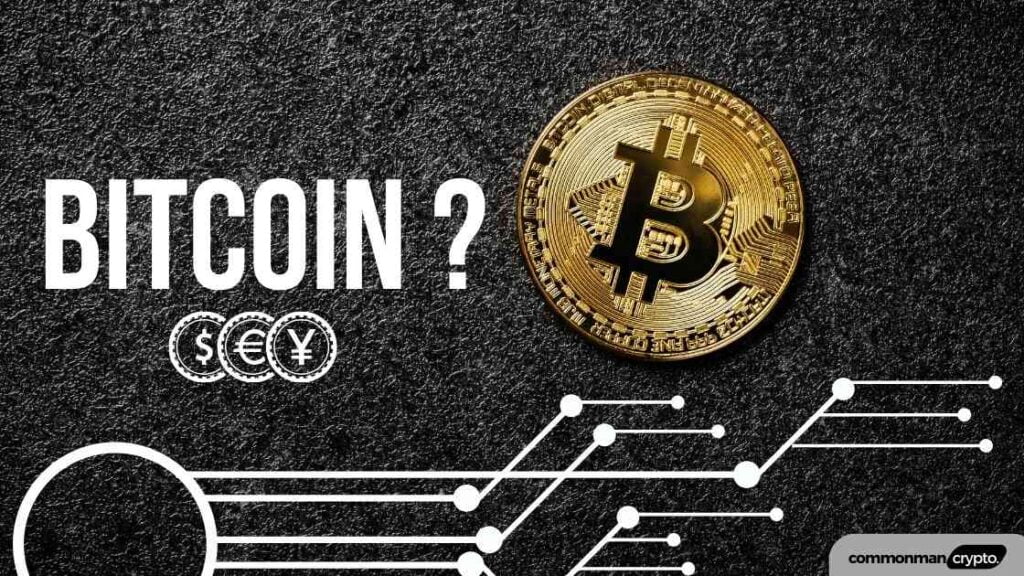Bitcoin was invented by Satoshi Nakamoto, an anonymous person or team who laid out its technology in a 2008 white paper. It’s an appealingly straightforward concept: bitcoin provides digital money that facilitates secure peer-to-peer transactions on the Internet.
- Bitcoin differs from Venmo and PayPal in that it does not depend on traditional financial structures for its operation, like debit/credit accounts or banks, for permission to transfer funds between people around the globe. Instead, two people from anywhere can send Bitcoin directly to each other without going through banks, governments, or other institutions as intermediaries.
- Every Bitcoin transaction is recorded on the blockchain, similar to how banks track customers’ funds coming in and out. Simply put, it serves as an archive of every Bitcoin transaction that has been completed.
- Contrary to bank ledgers, Bitcoin’s blockchain is spread throughout its entire network – no single company, nation-state, or third party controls it; anyone can join and become part of that global community.
- There will only ever be 21 million bitcoins, making this digital money incapable of inflation or manipulation.
- Not every Bitcoin purchase needs to be entire; purchase as little or as much as necessary based on your needs or desires.

Key Information
What is BTC?
BTC stands for Bitcoin.
Is Bitcoin cryptocurrency?
Bitcoin was the first widely adopted cryptocurrency – another term for digital money.
Is there a simple Bitcoin definition?
Bitcoin is a decentralized digital currency that facilitates secure peer-to-peer transactions without a central bank.
What’s the price of bitcoin?
CoinMarketCap website can provide the current price of Bitcoin.
Is Bitcoin an investment opportunity?
As with any asset, Bitcoin offers the potential for you to either profit by buying cheap and selling high or suffer losses by doing the opposite.
At what price did Bitcoin start?
In early 2010, one Bitcoin was worth just a fraction of a U.S. penny; by early 2011, however, it had passed the $1 threshold and skyrocketed rapidly by late 2017, reaching nearly $20,000. Bitcoin eventually reached $64,899 by November 2021; you can track its live price on the CoinMarketCap website.
Bitcoin is a decentralized digital currency that facilitates secure peer-to-peer transactions without a central bank.
Basics of Bitcoins
Since Bitcoin’s debut, thousands of new cryptocurrencies have emerged; however, bitcoin remains the dominant in market capitalization and trading volume.
Bitcoin can serve several different functions depending on your goals.
- Cryptocurrency is an investment vehicle similar to gold and is ideal for storing value.
- Financial Technology allows individuals and institutions to transfer value around the globe quickly.
- As an emerging technology is discovered and explored, espionage may provide an effective means of investigation.
- Bitcoin is an Internet currency designed for online transactions. Unlike government-issued currencies such as the dollar or euro, which require third-party intermediaries like banks or payment processors to transfer money, Bitcoin eliminates them all for the most direct and cost-efficient payment experiences and gives individuals maximum control of their assets.
- Bitcoin is legal to own, use, and trade, making it ideal for travel bookings and charitable donations. Businesses such as Microsoft and Expedia accept it as payment.
- Bitcoin can serve as a currency; its uses span from exchange, store of value, and unit of account. Yet, unlike physical money, only its digital representation exists; no physical copies exist as currency.
Who Created Bitcoin?
To fully comprehend how Bitcoin works, it is necessary to start at its inception. Who created Bitcoin is an intriguing question, as a decade after creating this technology, despite extensive investigation by journalists and crypto community members, its creator remains unknown.
- Bitcoin first debuted as an idea in a white paper written and published online in late 2008 by someone under the guise of Satoshi Nakamoto.
- This paper wasn’t the first idea for digital money to draw upon cryptography and computer science – in fact, the paper cited earlier concepts–but its unique elegance lay in how it created trust between online entities that may have differing identities (including Bitcoin’s creator) or be physically located across the world.
- Nakamoto created two interlinked concepts that form the core of Bitcoin: its private key and blockchain ledger. When you own Bitcoin, it is controlled via a private key–a string of random numbers and letters that unlocks a virtual vault containing your purchase; each private key is recorded on this virtual ledger known as the blockchain.
Bitcoin marked a breakthrough in computer science when it first came into being, solving an essential commerce-related problem on the web: how can two people exchange value without needing an intermediary (such as a bank) in between? By providing an innovative solution to this challenge, bitcoin has far-reaching ramifications: as an internet currency, it enables cross-border financial transactions without recourse to banks, credit card companies, lenders, or governments – providing easier financial transactions globally. Bitcoin delivers the potential for an open, more efficient, more accessible, and innovative financial system. That is its essence!
Bitcoin offers the potential for an open, more efficient, more accessible, and innovative financial system.
How Bitcoin Works?
Unlike credit card networks like Visa or payment processors like Paypal, bitcoin does not belong to any one individual or company – making it the world’s first open payment network in which anyone with internet access can participate. Furthermore, its design was tailored for online use without relying on banks or private firms to process transactions.
Bitcoin’s blockchain is a core component that tracks who owns what. Like a bank ledger, its main difference lies in being decentralized – meaning anyone can view it, and no single entity controls it.
Here are some details on how it all works:
- Mining rigs or computers explicitly designed to perform calculations needed to verify and record transactions perform these equations. Early desktop PCs were robust enough for participation; anyone interested could try mining. However, large, specialized computers often owned by businesses or large groups pooling resources are required today. (Nakamoto first mined his first blocks back in January 2009.) To successfully mine one bitcoin today requires twelve trillion times more computing power than was needed back then!).
- Miners use their collective computing power to ensure the integrity of an ever-expanding ledger known as the blockchain. Bitcoin itself is tied intimately to this chain; each new Bitcoin recorded, as well as each transaction with existing coins, are all recorded on it.
- As part of its continued mission to preserve and validate transactions, Bitcoin holds a continuous lottery that pits mining rigs worldwide against each other in a race to solve math problems first and update their ledger with valid transactions every 10 minutes or so. Prizes vary over time, but during May 2020’s halving of rewards, this decreased from 12.5 bitcoin per block winner to 6.25, with further reduction in 2024 due to further scarcity mechanisms.
- At first, bitcoins were relatively worthless. By 2019, however, they had reached almost $7,500; by November 2021, they had exceeded $64,000! Since its introduction, its easy divisibility (i.e., the ability to buy small fractions of one bitcoin) has become one of its hallmark features; one bitcoin can currently be divided up to eight decimal places (100 millionths of one bitcoin); in the cryptocurrency community this unit is known as ‘Satoshi.’
- Nakamoto designed his network so there would never be more than 21 million bitcoins in circulation, creating scarcity. By December 2023, there were around 1.44 million still available to mine – the final block should theoretically be mined by 2140.
Bitcoin is the first open payment network in which anyone with an Internet connection can participate.
How to Acquire Bitcoin?
The easiest way to buy Bitcoin is via an online exchange; they enable users to purchase, sell, send, receive quickly, and store Bitcoin without holding onto physical keys – thus simplifying the entire experience!
However, if you decide to purchase and store bitcoin outside an exchange platform, here’s how it works:
- Anyone joining the Bitcoin network receives a public key, which acts like an email address, and a private key – similar to a password.
- When purchasing Bitcoin or sending/receiving it, a public key is generated for you that serves as the key that unlocks its virtual vault and grants access to your money.
- Once a Bitcoin has been sent to your public key, only its owner – with access to their private key – can access it in their “virtual vault.”
- There are various online and offline methods of storing Bitcoin, with virtual wallets providing an effective solution.
- If you need to move money from your wallet into a bank account after selling Bitcoin, exchanges make this easy by setting a daily limit and taking a few days and one week for transactions to complete.
An online exchange provides an efficient platform for a quick and efficient way of purchasing Bitcoin.

Learn How to Use Bitcoin?
In 2013, Laszlo Hanyecz created a message board post offering 10,000 BTC – then worth roughly $25 – as payment to anyone delivering two pizzas to his Jacksonville, Florida, home. According to legend, those two pizzas, purchased by another early adopter from Papa John’s restaurant nearby using cryptocurrency, were the first successful purchase of non-virtual goods with bitcoin. However, modern times make using it much simpler!
- A quick note on Bitcoin transactions – they’re simple! For example, when using any credit or debit card, rather than entering card info directly via a wallet app, you enter the payment amount and vendor public key (like an email address) when transacting with BTC. A QR code might pop up when transacting in person with smartphones or tablets, simplifying this process by automatically populating all pertinent details into your wallet app upon scanning.)
- Paying with Bitcoin offers several distinct advantages regarding privacy: only when purchasing physical goods that need shipping will your name and address be required for fulfillment.
- Flexible: Your use of Bitcoin depends entirely on what interests you most; here are a few ideas:
- You can exchange or sell it for cash using a Bitcoin ATM.
- Utilize your Bitcoin debit card, and you can spend it like any other currency online or at physical retailers.
- As part of your savings and investment plan, you may choose to retain some or all of the money.
- Choose something close to your heart (check it out).
- Are You Longing to be an Astronaut? Richard Branson’s Virgin Galactic welcomes people with serious budgets who wish to experience space tourism on one of its forthcoming space-tourism missions by exchanging Bitcoins.
Bitcoin has quickly become a mainstream investment vehicle in the U.S., helping diversify a portfolio beyond stocks and bonds. You may also use it as currency when making purchases – although only certain vendors accept original crypto.
Major companies that accept Bitcoin include Microsoft, PayPal, and Whole Foods – though smaller local retailers or websites may also accept it after some research.
Use a service that connects a debit card to your crypto account, and use Bitcoin in much the same way you would use a credit card – usually instant conversion of Bitcoin into dollars by financial providers.
People in other countries – particularly those with less stable currencies – often choose cryptocurrency over their local currency as a form of payment.
Bitcoin offers people an alternative method for storing value without depending on a currency that is backed by the government, giving them the option to hedge against a worst-case scenario. It is already becoming popular in countries such as Venezuela, Argentina, and Zimbabwe (heavily in debt), where Bitcoin usage is growing quickly.
When using Bitcoin as currency in the United States rather than as an investment vehicle, certain tax implications must be considered.
Due to their cryptographic nature, bitcoin payments are inherently more secure than standard debit/credit card transactions.
What sets Bitcoin apart as a new form of currency?
Bitcoin is global. You can transfer it around the globe as easily as sending cash across borders; no weekend closings; no fees charged when accessing funds and no restrictions set on them either – that makes Bitcoin truly revolutionary in comparison with existing forms of money that impose limits and restrictions arbitrary limits imposed on you in some form or another imposed upon them – you just pay with Bitcoins like they’re physical dollars!
Bitcoin transactions are irreversible, similar to cash. Credit cards, conventional online payment systems and banking transactions may be reversed even months later by intermediaries responsible for processing them; creating higher fraud risk for merchants that leads to higher fees when accepting credit cards as payments.
Bitcoin payments are completely anonymous and require no personal information or bank statements for merchants to transact using this method of payment. All identifying details remain hidden apart from bitcoin addresses and amounts involved in each transaction.
Bitcoin payments are inherently secure due to the cryptographic nature of the Bitcoin network and are vastly more secure than standard debit/credit card transactions. When making a bitcoin payment, no sensitive data needs to be transmitted over the internet – thus significantly decreasing your risk of having your financial information compromised or identity stolen.
Bitcoin is designed to be open. Every transaction on its network is publicly recorded and transparently published – leaving no room for manipulation (save for an unlikely 51% attack scenario) or alteration to supply or demand of bitcoin. Furthermore, its software foundation is free and open source so anyone may review its code base.
Bitcoin is safe. After more than ten years, its network has never been successfully breached; and because its system is permissionless and open-sourced, countless computer scientists and cryptographers have examined every aspect of its security.
How does Bitcoin Originate?
Bitcoin is created through a decentralized (commonly referred to as “peer-to-peer”) network of computers which use blockchain technology to ensure accuracy in every transaction involving bitcoin, with new information periodically collected into “blocks,” which are added onto all previous ones.

How to Buy Bitcoin
Most people purchase Bitcoin through cryptocurrency exchanges. Exchanges allow individuals and institutions to trade and store cryptocurrency. Establishing an account on such an exchange requires similar steps as opening a brokerage account – identity verification. Some type of funding source, such as bank account or debit card details, will need to be provided.
Major exchanges include Coinbase, Kraken, and Gemini. You can also buy Bitcoin through an online broker such as Robinhood.
No matter where you purchase Bitcoins from, a wallet to store them will be required for safekeeping. This could either be called a “hot wallet” or “cold wallet.”
Hot wallets (sometimes referred to as online wallets) are hosted in the cloud by exchanges or providers such as Exodus, Electrum, and Mycelium. Cold or mobile wallets exist as offline devices for storing Bitcoin that do not connect to the Internet – such as Trezor and Ledger.
Notes on purchasing Bitcoin: While Bitcoin may be expensive, fractional Bitcoin purchases are available from certain vendors. Also, be mindful of fees; typically just small percentages, but they can add up quickly with small-dollar purchases. Finally, Bitcoin purchases do not happen instantaneously like other equity purchases due to miners verifying them first – typically taking 10-20 minutes until your new cryptocurrency appears in your account.
How to Invest in Bitcoin
Like stocks, Bitcoin can be purchased and held as an investment asset. Special retirement accounts known as “Bitcoin IRAs” make this even simpler.
No matter where they hold their Bitcoin, people’s philosophies on how best to invest their coin differ significantly: Some buy and hold for long-term investments, others purchase and aim to sell after price rallies, and others bet against its decrease. Bitcoin prices have historically experienced large price swings between $5,165 and $28,990 annually in 2020 alone!
“People may use Bitcoin for transactions, but the reality is that it’s an asset whose value will likely continue to appreciate significantly over time,” according to Marquez. “So why would someone sell an investment which will likely become worth far more next year than today? Most Bitcoin holders tend to hold on for long term.”
Consumers looking to invest in Bitcoin mutual funds may purchase Grayscale Bitcoin Trust (GBTC) shares. However, the minimum investment requirement of $50k precludes most American investors from doing so. Diversified Bitcoin investing has become more accessible in Canada; Purpose Bitcoin ETF (BTCC) began trading as the world’s first ETF, and the Ontario Securities Commission has approved Evolve Bitcoin ETF (EBIT). American investors seeking similar exposure could consider blockchain ETFs that invest in cryptocurrencies‘ technology instead.
Important note: Though crypto-based funds may help diversify crypto holdings and reduce some risks, they still carry much higher fees and risk than broad-based index funds with proven records of steady returns. Investors looking for steady wealth growth may prefer index-based mutual and exchange-traded funds (ETFs).
Frequently Asked Questions (FAQs)
How does Bitcoin gain its value?
How does digital currency work? In essence, like traditional currency does – as an effective and accessible way of storing value that can easily be traded for goods, services, or assets? Digital currencies like bitcoin are designed as viable stores of value that are scarce but secure compared with gold while being divisible enough for transactions of any size.
What are the differences between Bitcoin and Blockchain?
All Bitcoin transactions and public keys are recorded on a virtual ledger known as the blockchain, which acts like a chronological list of transactions. The ledger is identically replicated across every computer connected to the Bitcoin network and is constantly monitored and secured using vast computing power from around the globe. Blockchain technology has proven itself robust yet adaptable; various non-cryptocurrency-related blockchains now exist that record things such as supply-chain management; however, ‘Bitcoin Blockchain’ refers only to its original purpose of recording bitcoin transactions and private keys.
What is Bitcoin and how does it work?
At its core, bitcoin is a digital token representing value. Your public key assigns ownership of it to you; when transactions occur between parties with different public keys, ownership changes. Transactions take place using a wallet application to send and receive Bitcoin.
Is Bitcoin actual money?
Bitcoin has quickly become accepted as an acceptable medium of exchange and store of value, and it is widely recognized as a unit of account. Two key influences driving its price volatility include greed and fear of missing out on significant returns.
Is Bitcoin good or bad?
Bitcoin’s speculative nature and recent volatility as key characteristics but still sees potential for its inclusion as part of long-term portfolios, provided allocation is kept to 1 to 5%. “Risks can be high,” but failing will cause minimal material harm.
What is Bitcoin made of?
Bitcoin’s decentralized digital record, or blockchain, serves as its foundation. Blockchains are linked bodies of data consisting of blocks containing details about every transaction, such as date/time/value information, buyer and seller identities, and an exchange ID code for each exchange.
Is Bitcoin 100% safe?
Security Risk: Most people who own and use Bitcoin do not obtain them through mining operations; instead, they purchase and sell these virtual tokens through popular cryptocurrency exchanges – completely digital platforms exposed to hackers, malware attacks, and operational glitches.
Who control Bitcoin?
Bitcoin is not managed or run by one group or individual; instead, governance rests with multiple stakeholders: developers, miners, and users. Developers write the code that runs Bitcoin; miners validate transactions; and users put this software to use through trading, transacting, holding, and more.
Are bitcoins legal?
As of March 2024, Bitcoin was legal in most developed nations such as the US, Japan, the UK, and more – although its legal standing varied drastically in emerging markets and other areas.
Should You Buy Bitcoin?
Financial experts often support their clients’ desire to invest in cryptocurrency, though they typically don’t advise it unless there is explicit client interest. Ian Harvey, a certified financial planner (CFP) from New York City, stated, “Our biggest worry would be if someone invests in crypto and their choice doesn’t do well; then suddenly their children cannot go to college – then the risk wasn’t worth taking!”
Due to cryptocurrency’s volatile nature, some financial planners suggest it as a “side” investment option for clients. “Some call it a Vegas account,” according to Scott Hammel of Dallas Financial Planning Company – but let’s keep this outside our main long-term view – ensuring it does not become an overwhelming part of your portfolio.”
Advisors do not advise allocating too much of your portfolio into Bitcoin; at most, planners would suggest allocating 1%-10% if that interests you. If it were one stock, no significant portion of it would ever make up their allocation.










1 thought on “What is Bitcoin? (2024)”